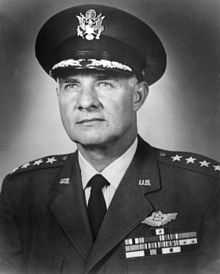Frank F. Everest
| Frank F. Everest | |
|---|---|
 General Frank F. Everest | |
| Born |
November 13, 1904 Council Bluffs, Iowa |
| Died |
October 10, 1983 (aged 78) Council Bluffs, Iowa[1] |
| Allegiance |
|
| Service/branch |
|
| Years of service | 1928–1961 |
| Rank | General |
| Commands held |
Tactical Air Command U.S. Air Forces in Europe |
| Battles/wars |
World War II Korean War |
| Awards |
Silver Star Legion of Merit Distinguished Flying Cross Air Medal |
Frank Fort Everest (November 13, 1904 – October 10, 1983) was a United States Air Force general, and served as Commander, U.S. Air Forces in Europe, and Commander, Tactical Air Command.
Biography
He was born in Council Bluffs, Iowa, in 1904. He graduated from the United States Military Academy on June 9, 1928 and was commissioned a second lieutenant of Field Artillery.
Entering Primary Flying School at Brooks Field, Texas, Lieutenant Everest graduated from Advanced Flying School at Kelly Field, Texas, in September 1929, with initial assignment to the 8th Attack Squadron at Fort Crockett, Texas. After completing the armament course at the Air Technical School at Chanute Field, Illinois, in March 1933, he held several assignments at Maxwell Field, Alabama. Everest was promoted to first lieutenant in 1934, and to captain a year later. Captain Everest graduated from the Air Corps Tactical School at Maxwell in June 1937.
He then served in Hawaii at Wheeler Field with the l8th Pursuit Group, moving to Lowry Field, Colorado, in September 1939 as an instructor in the Air Corps Technical School. Everest was promoted to major in January 1941. The following August Major Everest was assigned to Headquarters, Army Air Forces, for duty in the Plans and Training Division. He became a lieutenant colonel in January 1942 and in March joined the Operations and Planning Division of the War Department General Staff. He also became a colonel in March.
In August 1942 Colonel Everest was assigned to Headquarters, U.S. Army Forces in the South Pacific Area, where he served successively as liaison officer to the commander, aircraft, South Pacific; commanding officer of the 11th Heavy Bomb Group at New Hebrides Islands and Guadalcanal; and Army air officer on the staff of the commander of the South Pacific Theater. For combat action Everest earned a number of awards including the Silver Star for a key mission from Guadalcanal against the Japanese on February 13, 1943.
Colonel Everest was reassigned to Air Corps Headquarters as Air Force director of the Joint War Plans Committee in the Office of the Assistant Chief of Air Staff for Plans in January 1944, and became a brigadier general in June. He joined the special organizational planning group at Air Corps Headquarters in November 1945. Two months later he was designated Air Force member of the Joint Staff Planners of the Joint Chiefs of Staff, and in August 1946 he assumed additional duties as deputy assistant chief of air staff for plans at Air Corps Headquarters.
Everest assumed command of the Yukon Sector, Alaskan Air Command, with Headquarters at Ladd Field, Alaska, in January 1947 and remained there until June 1948 when he was named assistant deputy chief of staff for operations at Air Force Headquarters in Washington. He became a major general in April 1948. In March 1950 he assumed the additional duty of senior Air Force member on the Military Liaison Committee to the Atomic Energy Commission.
Everest became commanding general of the Fifth Air Force, Far East Forces, in Korea in May 1951. Through his efforts, the Fifth Air Force was able to attain, and maintain, air superiority over the enemy.
Everest became a lieutenant general in December 1951. In mid-1952 he was appointed deputy commander of the Tactical Air Command at Langley Air Force Base, Virginia. He was named director of the Joint Staff in the Office of the Joint Chiefs of Staff, Washington, in April 1953. One year later he was designated deputy chief of staff for operations at Air Force Headquarters, a post he held until July 1, 1957, when he was appointed commander-in-chief of the U.S. Air Forces in Europe and promoted to a full general.
Returning to the United States on August 1, 1959, General Everest was assigned duty as commander of Tactical Air Command, Langley Air Force Base, Virginia. He retired on October 1, 1961.
Everest was awarded the Air Force Distinguished Service Medal with oak leaf cluster, the Silver Star, the Legion of Merit, the Distinguished Flying Cross, the Air Medal, Honorary Companion of the Military Division of the Most Honorable Order of the Bath, Republic of Korea Military Merit Taeguk Medal, World War II Victory Medal.
He died on October 10, 1983.
General Everest was not related to General Frank Kendall Everest, Jr..
References
- ↑ "The Deseret News - Google News Archive". News.google.com. Retrieved 2011-12-22.